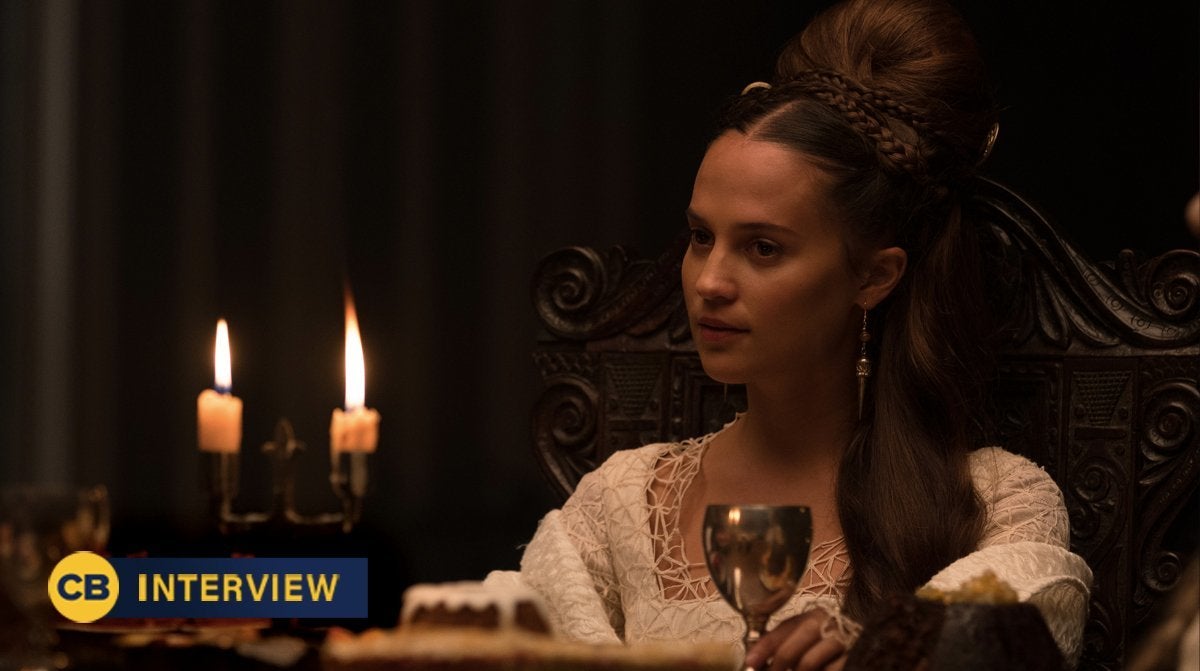The tales of King Arthur have been told for centuries, with their chronicles of heroes and villains all earning slight deviations dependent upon the storyteller relaying such adventures. In the realm of cinema, most Arthurian adaptations offer literal reflections of these narratives, detailing the swinging of swords and shields to the delight of audiences, though director David Lowery has taken a new approach to these concepts with The Green Knight. Just one indicator of his unconventional decisions involves casting Alicia Vikander as two different characters in the journey, both of which are key figures in the experiences of Dev Patel’s Garwain. The Green Knight hits theaters on July 30th.
Videos by ComicBook.com
An epic fantasy adventure based on the timeless Arthurian legend, The Green Knight tells the story of Sir Gawain (Patel), King Arthur’s reckless and headstrong nephew, who embarks on a daring quest to confront the eponymous Green Knight, a gigantic emerald-skinned stranger and tester of men. Gawain contends with ghosts, giants, thieves, and schemers in what becomes a deeper journey to define his character and prove his worth in the eyes of his family and kingdom by facing the ultimate challenger.
ComicBook.com caught up with Vikander to talk about her own personal heroes, playing dual roles in the film, and the status of her Lara Croft Tomb Raider sequel.

ComicBook.com: This is a timeless tale, this Arthurian legend of heroes and honor. When you were growing up, did you personally have any heroes or role models, fictional or otherwise, that you looked up to?
Alicia Vikander: Oh, wow. I mean, it’s so typical. I’m so Swedish, but when I was a little kid, I loved Pippi Longstocking. She’s a pretty amazing, cool character, but I actually got to read in some books and voice her now, as an adult, which was pretty cool.
This is not your standard take on the tale of knights and heroes and ladies and that sort of thing, so when you were getting involved in this project, at what point did you realize, “Oh, this is not at all what people might be expecting,”? Was it the script that gave that away? Was it speaking with David? Was it not until you got on set? When did that click for you?
I think when I met David. I met him before I had read the script. We met generally, and I’m a huge admirer of him as a filmmaker, and this thing just came up, because he said, “I’m working on this script. I’m trying to adapt this poem.” And we talked about it. I had only heard about the poem. I did not know about it. It ended up, after we met, I remember I went online and I didn’t realize how much that has been written throughout the times about this poem.
It’s interesting to see how, based on what time you’re in, the essays from PhDs that people have written about it very much change, as with any great literature work, I guess. But I think I understood, already from the conversations, that it was going to be quite different, also, because it’s in the hands of David. Then he sent me the script, and I read it. I was so, first of all, impressed, because it is a daunting thing to try and not only … I mean, we’ve seen a lot of adaptations of the Knights of the Round Table. But here, he dared to go into the depth and complexity of the original poem, that, of course, to most people today still feels very old. I mean, it’s 700 years old.
But when I read it, I felt like he had dared to be as magical, yet as complex and ambiguous and open to the meaning of the poem with the film itself. I understood that it was going to be pretty special, but then knowing that, in the hands of David who … He’s doing Peter Pan right now, I knew that he had a love for knights and horses and big landscapes and adventure. So I knew it was going to be explained, or put in the setting of something that feels quite big and also commercial, in the sense that I think a lot of people will find it extremely visually attractive and really entertaining.
You use the word “daunting” and you bring up how people — professors and academics — have been analyzing and studying this poem and interpreting it for hundreds of years, so when it came to bringing this to life, did you feel the weight of that legacy on set while shooting or is it still just a pretty traditional filming experience?
No, I think I give that honor to David. In one way, he took it upon himself to try and condense it and make it translate into film and I think he did such a beautiful job. And, of course, then I enjoyed having a poem in the film, but that was something that David added. And it shows that he’s not just a brilliant filmmaker, he’s also a great poet and dared to put it in the mix himself.
I think it was present that we were handling these questions about morality and life, but that just added to the wonderful experiences and the conversations and also takes throughout filming, that ended up always, in a magical way, giving you things that you didn’t know, that you had read on script. It’s good writing, in the sense that there’s so many levels to it. It has a lot more meanings than I maybe realized the first time I’d read it, or first time I made the scene. Then, when I’ve seen the film a few times, I also … I don’t know if it’s depending on my own [mood] or what it is I bring in my head, just before watching the film, but I always tend to feel the new things, which it just shows to David’s brilliance.
You were tasked with playing two different roles, who are both important to Gawain’s journey, but are a different approach, a different perspective. They’re different foils, they’re antagonizing and evoking different things in Dev’s character. When it came to developing your interpretations of the characters, was it an active process on your part of, “This is how I’m going to keep these characters similar and this is how I’m going to keep these characters different,”? Or is it the fact that they are completely different characters and they just happen to be being played both by you and that was how you were navigating those approaches?
Well, I totally thought about the double duty, but I think it’s more that thing of realizing, “Well, it is me playing both. So people are definitely going to see it.” That is there. And then the work, for me, is obviously a bit more trying to make very distinctly different characters. But then, by David asking me if I want to do these two roles, it was interesting when I read it the first time. It was already there, this mirror aspect of these two characters. And it’s also, being this coming-of-age story, a young man who also seeks the things that he doesn’t have or he thinks he doesn’t have. The grass is greener on the other side, the adventures that he longs to be part of, or the legacy he wants to build. Then it’s this woman that he suddenly is totally enchanted by.
We don’t know if he can’t, or if he chooses not to see the resemblance, that it seems like she has a very similar face to the woman that was already there, already next to him, already at home, waiting for him.
As far as actually shooting the film goes, I know Dev has talked about, “Yeah, Ireland is gorgeous and beautiful, but it was also pretty freezing at times.” Did you have many experiences, any particularly tough days on set?
Oh, my God. I think it’s my curse. I only make films where I have to be in cold water, or I’m cold. And on this, I was very happy. I had quite a lot of long skirts and stuff, so I’d just put thermal pants and Ugg boots and stuff, which was easier. He was barefoot in a lot of things. I didn’t have to do that, for one, but above anything, we went to some incredible places. I mean, the kind of nature and beauty that looks … The magic is there, it looks like a wonder. And sometimes when you get up early in the morning and you see these horizons and the fog that is not fake movie smoke, that’s real, it’s pretty spectacular.
Then you read the 700-year old poem, you’re like, “Yeah, it’s here.”
I like to think that there are shots or scenes where you can actually see your Ugg boots, and audiences think, “Wow, that was a really inventive approach that David took, to blending contemporary fashion with the olden days.”
Yeah, you can make that [claim]. If someone finds that frame, they get a prize or something. It’ll be a fan journey.
I don’t really want to speak too hyperbolically, but after having watched the film, it’s almost that you feel like a different person from the person you were when you start watching it, to the person you are when you finish watching it, just because it is so complex and layered and existential. For you, who do you feel you were when you started shooting this movie and how did the shoot impact you as a person?
Well, it’s interesting. I thought a lot about Essel says, “Why greatness? Why is goodness not enough?” I think it’s also part of … I’m kind of impressed if a young woman like Essel, she’s already proven to, or she must have already lived quite a life to realize those truths. And I can see the 20-year-old me, how I was. It’s a certain naivete, and also, that I can treasure or admire the romantic view on life and how you just want to do everything. You want to get out and live and why settle for anything less for anything?
Now, I find myself, like, “Oh, I like to read a book and be in my home garden.” Life has changed and a lot of it is finding yourself back home, I’ve realized, at least for me. So, in one way, that’s something that’s, of course, resonated very strongly with me, especially now later on when I’ve seen it, maybe even more after this very strange and sometimes the graphic year, but that brought me home.
I haven’t stopped working for 12 years and I think I’ve now started to see or treasure in life quite differently, after I’ve gotten that chance, to just take things a bit slower and have time for my close and loved ones.
Since you talked about some of the difficult shoots and difficult projects you’ve been a part of, obviously everybody is waiting and excited for when your new Tomb Raider could move forward. I was just curious if there are any status updates on that. I know COVID is in an upswing, so I’m sure that’s not helpful for that film.
[Writer/director] Misha [Green] is about to … A script is coming in very soon. She’s extremely hardworking. And so, I can’t say anything, because like you said, COVID put everything just up in the air. But yeah, I’m excited to read scripts and hope that it’s something that we’ll find a way to make.
*****
The Green Knight hits theaters on July 30th.
This interview has been edited for length and clarity. You can contact Patrick Cavanaugh directly on Twitter.








